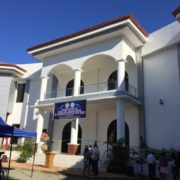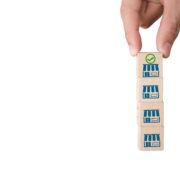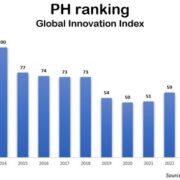
Contributing to the needs and addressing the bottlenecks in the value chain of priority industry clusters, the Department of Trade and Industry (DTI), spearheaded by the Regional Operations Group (ROG) Undersecretary Blesila Lantayona, granted the provision of Shared Service Facility (SSF) laboratory equipment to Mariano Marcos State University (MMSU). The ceremony transpired during the inauguration of the state university’s National Bioenergy Research and Innovation Center (NBERIC) in Brgy. Quiling Sur, Batac, Ilocos Norte last January 23.
The P50-M SSF consists of machineries for Bioenergy Innovation, Incubation Hub and Product Testing Center for Renewable Energy stored in the NBERIC Building.

“We are happy for being part of this project. DTI has already provided the equipment so they can start the activity. Now, DTI still owns the equipment, but if the cooperator, which is MMSU, can operate it optimally and can show us that all the equipment are being used, then, in a span of two years, these equipment will be awarded to the MMSU. During the 2-year period, ano man ang mangyari sa mga makina, sagot ‘yan ng DTI,” said Usec. Lantayona.

As DTI’s cooperator, MMSU will regulate the utilization of the SSF for the beneficiaries, such as the researchers, innovators, teachers and students, stakeholders, and especially, the micro, small, and medium enterprises (MSMEs) where they could tap a better and wider market share, and be integrated into the global supply chain.
“The equipment will serve two purposes: for continuous research to form the innovative ideas of young researchers, scientists, in the development of the technology; and at the same time, this is going to be a training facility for the farmers and even entrepreneurs whom we are developing as scientists in the village,” MMSU President Dr. Shirley Agrupis explained.
The bestowed SSF apparatuses will contribute to the research center’s goal as to capacitate all the key players and stakeholders in bioenergy for countryside development through bioenergy research, training, extension, and techno-preneurship.

Furthermore, aiming to improve the competitiveness of MSMEs, the SSF Project is being implemented nationwide with project partners, which may be any juridical entity such as but not limited to non-government organizations, people’s organizations, cooperatives, industry/trade/business associations, local government units (LGUs), state universities/colleges technical vocational schools and other similar government and training institutions.
To date, DTI has already established 2,528 SSFs nationwide mounting up to P1.6-B expenditure since 2013, and 220 of it were launched in Ilocos Region with 3,225 beneficiaries and 4,539 jobs generated. Most of the SFFs granted are designed for food processing, loomweaving and furniture industry.






